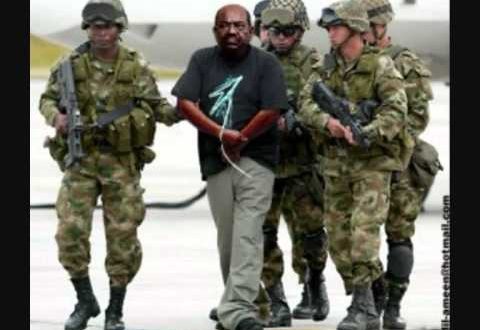The Arab Network for Crisis Information is following with deep concern the systematic violations and the vicious attack it is carrying out The Sudanese authorities from time to time, on press freedoms and freedom of opinion and expression and press publication, repression and confiscation, calling journalists and banning travel, without any obvious reasons in violation of the Sudanese Constitution and the violation of human rights charters. The Arab Network for Crisis Information monitors some of these violations, including:
1 / The security authorities prevented four journalists from traveling to Saudi Arabia on Tuesday 22/5/2018 without any reasons. The invited delegation included the editors of the newspapers “Al-Tiyad”, “Al-Jarida”, “Bag News” .
2 / The security authorities subjected a group of journalists to investigate after their return from Riyadh at the invitation of the Embassy of the Kingdom of Saudi Arabia in Khartoum on the pretext that the visit was conducted without coordination with the Sudanese authorities and because of their meeting with Taha Othman, Advisor to the Saudi Foreign Minister for African Affairs.
3 / The security authorities put a list of prohibitions, after the impact of some events on public opinion, by issuing instructions to the editors not to deal with some of the topics that he considers a “red line”, including the case of businessman Akasha Mohammed Ahmed accused of money laundering and the destruction of the national economy and His death occurred under mysterious circumstances in the custody of the Sudanese security apparatus. However, the security service was quick to issue a statement attributed to one of the officials in the agency stating that Okasha had “committed suicide” by hanging himself inside the security services’ escorts on Thursday, May 17. The security authorities issued orders to the heads of the liberation not to publish the issues related to the lack of hydrocarbons, the biggest crisis faced the system in Sudan, while the security prevents the local newspapers from addressing the crisis, but found wide coverage of news agencies and satellite channels as well as images presented by some activists through social networking sites and applications Which has been documented for long queues at fuel stations.
4 / The security authorities confiscated the newspapers (Baath) of the tongue of the Baath Party of Sudan, (newspaper) (shout) (news home) the tongue of the Sudanese Congress Party, in different parts of this month from the printing press after printing without giving reasons, ) Was subjected to prolonged harassment at the printing press for hours after the distribution vehicles had left the market. 5 / The security authorities summoned the correspondent of the newspaper “Middle East” in Khartoum, Mr. Ahmed Younis during the month of May, to investigate a report published by the newspaper entitled “Sudan … Operation” Hummingbird “version of the brothers (dealing with the conflict within power. Therefore, the Arab Network for Crisis Information condemns in the strongest terms these abhorrent practices and expresses its deep concern about the continued escalation by the security authorities in Sudan. The Arab Network for Crisis Information states:
First, the right to travel and travel is guaranteed by the Constitution and international covenants. The security authorities have no right to prohibit or prohibit journalists from traveling, restrictions or conditions for travel or travel inside and outside the Sudan. The investigation of the journalist, whether for reasons of publication or travel, And international trustees.
Second: The prohibition of publishing in a number of subjects, which represent the issues of the hour and the citizen’s concern and is linked to his daily pension, is unfortunate and violates the Sudanese constitution. How can this crisis be concealed by blocking the information from the reader and preventing journalists from publishing it? The publication ban will not contribute to the crisis. And contributes to the spread of rumors, which harms the reputation of the ruling regime and undermine the credibility of its officials, making people make fun of them and their irresponsible remarks.
Thirdly: Confiscation of newspapers After printing, many newspapers have been subjected to losses, deliberate behavior intended to cause damage to publishers and newspapers. This confiscation is a postwar punishment, which makes editors and publishers censors of newspapers and journalists to avoid confiscation and puts journalists at risk. The selection of some material for publication by the practice of “self-censorship,” so as not to fall into the trap of the security apparatus and the anger of the publisher. These are the most dangerous types of censorship that weaken professionalism and credibility by publishing some facts and hiding others. In recent years, the security apparatus has created the idea of resorting to the judiciary as a complainant, as if it is the victim of publication, but it does not stop interfering in the newspapers and practicing its hobby in repression and confiscation. It is regrettable that the Union of Sudanese Journalists and the Press and Publications Council on the organization of the profession are silent about these violations without condemning them, and are entrusted with providing protection to journalists. These violations put Sudan’s name at the bottom of Reporters Without Borders’ report on press freedoms.
The Arab Network for Crisis Information calls on all journalists, jurists, interested parties and relevant parties to work in the press to address these violations against newspapers and journalists and to protect the freedom of opinion, expression and press publication, and renew the call to prevent and stop the interference of the security apparatus in the press and to oblige it to restrict the constitution, Jurisdiction. The Arab Network for Crisis Information also calls on journalists to resort to the judiciary to stop the practices of the security apparatus to confiscate newspapers after printing, and to prevent journalists from traveling and ban publication.
May 2018
Cairo.
 Laa-Laa لا لا موقع شباب السودان الحر
Laa-Laa لا لا موقع شباب السودان الحر












